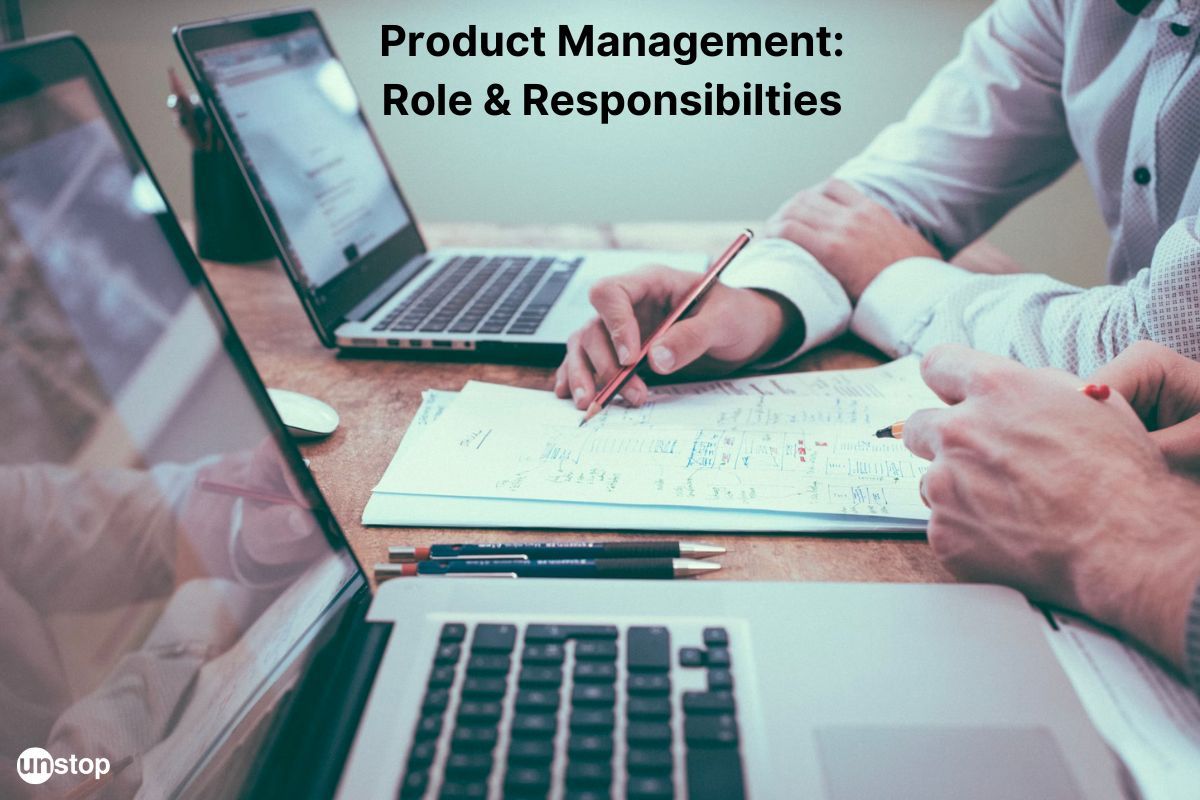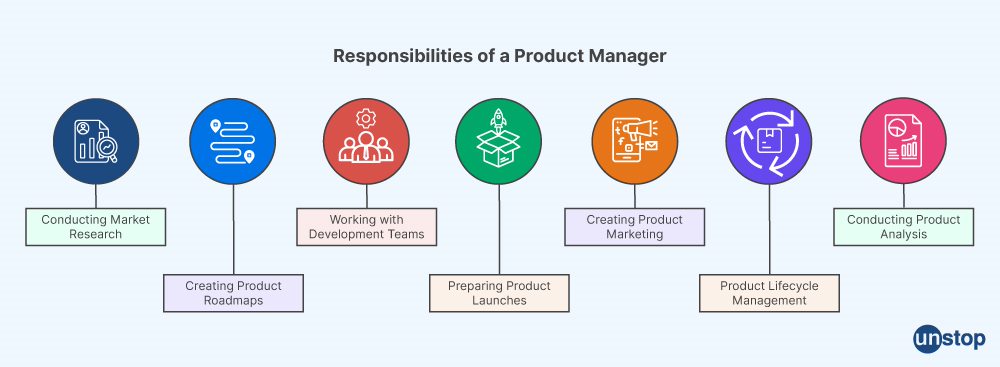- Product Manager: CEO Of The Product?
- Product Management Roles & Responsibilities
- Competencies Required To Be A Product Manager
- Product Manager vs. Product Owner
- Types Of Product Managers
- Product Management Certification
Product Management Roles & Responsibilities: Here's What A Product Manager Actually Does

We live in an increasingly digital world today where we have an app for everything - including an app to manage all the other apps we have. Moreover, we have to only think of a product or service, and chances are, it already exists. After all, from round rotis to virtual reality, there is a product or service for almost everything.
Behind each of these products, no matter how innovative or commonplace, is most likely a product manager - an individual who oversaw a product from the ideation stage to actual use. But what does this translate into?
This translates into product management - a business role wherein managers (and their teams) develop a product strategy, communicate the product vision to relevant teams, build a roadmap for execution, test the product, launch it into the market, and ultimately, analyze the user experience.
While product management has certainly gained momentum in recent years, the idea of an individual employee being responsible for an entire product has been around for over 90 years - 92, to be exact.
Yes, the idea was first introduced by former US Defense Secretary Neil H. McElroy in 1931. At the time, McElroy was working as a marketing executive with the consumer goods manufacturer Procter & Gamble. McElroy, who went on to become the President at Procter & Gamble, shared a memo in May 1931 outlining the need for "brand men" - individuals who were solely dedicated to promoting a product. These brand men were tasked with overseeing multiple marketing and sales activities for a product, including but not limited to packaging, distribution, sales tactics, etc. And thus, the idea of a product manager was born.
Today, the role has evolved to encompass multiple different areas of responsibility, and product management has become a core business function in most organizations.
Read ahead to understand product management roles, essential skills for the role, and how it differs from other roles in the organization:
Product Manager: CEO Of The Product?
"A good product manager is the CEO of the product."
Ben Horowitz, the co-founder and former CEO of software company Opsware said this 15 years ago. The statement has today become a mantra to define product management roles. But, is Horowitz actually right? To a certain extent yes, but there are certain nuances to product management we need to keep in mind, before delving deeper into product management roles and responsibilities.
Horowitz was right about the fact that product managers take on ownership of a product. But they do not enjoy complete independence in developing the product. Nor are they solely responsible for the execution. Simply put, while they may draft the product roadmap, they still have to take into account the concerns and capabilities of different teams and receive approval from senior management.
Moreover, they're different from product owners (who're actually responsible for developing a product), or product marketing managers (who're responsible for successfully marketing a product). To sum it up, they may certainly behave like the CEO of the product, but product managers need to collaborate with multiple teams to bring the product vision to life.
Product Management Roles & Responsibilities
If you've ever seen different job descriptions for a product manager and been confused about what a product management role actually entails, then you're not alone.
Product management roles and responsibilities depend on several factors, but the two main factors are the size of the organization and the type of product or service being developed. The position can thus differ from organization to organization, and even from department to department. In other words, the same organization can have different product management roles and responsibilities depending upon their business goals.
However, broadly speaking, listed below are seven core areas of responsibility:
Market Research
The first step in understanding the product-market fit is market research. Depending upon the size of the organization and team structures, product managers may conduct the research independently, or collaborate with other teams (like research or marketing teams). As part of market research, they understand the market trends, customer requirements, and competition. This activity will guide all the other activities, from product launch to product marketing.
Creating Product Roadmaps
Creating product roadmaps is a core area of responsibility. This is where managers outline the product strategy and break it down into tasks (usually, divided by team and timelines). At times, they may also be involved in breaking down the tasks into actionable items, though usually, this falls on the project manager.
Creating a product roadmap allows all parties, including external customers or stakeholders to envision the time and effort involved in the product development.
Working With Development Teams
This is where managers communicate the product requirements on the basis of user feedback to the product development team. The product team then works on developing the required product features or product designs. For example, in a tech company, this is where coders, UI/UX developers, and designers, among other teams, may come together.
The product development team is involved in actually developing and testing the product but product managers are closely involved in the product development process. Because, it's imperative they understand the various aspects of product development, take into account the challenges and help prepare the product backlog, if required.
Product Launches
Once the product has been developed and tested, it's time to take the product to market. Herein, managers need to decide the timing and scale of the launch, coordinate with the marketing team on marketing campaigns, and ensure the product is market-ready.
Product Marketing
As the name suggests, this is where marketing strategies are drawn to market the product and ensure it reaches the target audience, and even permeates to other segments. This is where product managers and product marketing managers collaborate to plan various marketing activities for the product. Product managers rely on the marketing skills of the team but are most likely to provide input on the messaging of the marketing campaigns.
Product Lifecycle Management
As mentioned earlier, product managers oversee the complete project lifecycle, which includes managing the product after launch. This includes but is not limited to, understanding the organic and inorganic adoption of the product, managing its evolution from growth to decline, forecasting trends, etc.
Product Analysis
This is the stage where a product's performance is analyzed. This may take place after the initial product demand has been met, and customer feedback or user stories are readily available. This could include mapping actual sales vs forecast and performing a comparative analysis of the product with the competition, among other activities.

All of these responsibilities are part of product management roles. As mentioned earlier, the exact role and responsibility may differ between organizations and/or departments. A particular role or responsibility may also include different tasks, depending upon the product or service being developed.
Ultimately, the goal is to create viable products that not only meet customer expectations but also enhance customer engagement. Effective product management is only possible when managers have hands-on experience in each stage of product development. This enables them to understand and provide solutions to any challenges that may occur.
Competencies Required To Be A Product Manager
It's not compulsory for product managers to have a management or technical background but they are expected to exhibit basic technical skills and business acumen.
Apart from this, certain soft skills are crucial to a product manager role, and most experienced product managers exhibit most, if not all, of these skills:
Communication Skills
Strong communication skills are a must-have. It's important that product managers are able to clearly and effectively communicate product requirements to all product teams.
Strategic Thinking
It goes without saying that strategic thinking is an important skill for product managers. It's nearly impossible for an individual to solve complex problems or plan for the future without adopting a strategic approach - especially when faced with unexpected challenges or problems.
Leadership Skills
A product manager has to be a good leader, able to assign tasks, hold people accountable and encourage them to push ahead. A good leader is also one who is able to delegate effectively. And by its very definition, product management involves delegating tasks to different teams and overseeing their progress.
Time Management
One of the main reasons why McElroy came up with the idea of dedicated brand men was to maximize effectiveness and better manage an individual's time and skill. Even today, time management i.e. coordinating the tasks of different teams to ensure that people do better work in less time, is an important skill, especially for a product manager.
Collaboration Skills
A product manager has to collaborate with different product teams. Product management involves cross-functional teams, and effective collaboration between product managers and other teams is key to a product's successful launch.
Product Manager vs. Product Owner
The job titles of the product manager and product owner are often used interchangeably, but the two have different roles and responsibilities.

Here's a snapshot of the major differences between the two product roles:
| Product Manager | Product Owner |
| Works with both internal and external stakeholders | Works only with internal stakeholders |
| Defines the product vision and creates a product strategy/product roadmap | Brings the product vision to life by executing the strategy |
| Directly responsible for mapping and analyzing the ROI, marketing, etc. | Directly responsible for creating product backlog, incorporating product design and features, etc. |
| Offers a high-level view of the product lifecycle | Involved in the day-to-day execution |
Types Of Product Managers
There may be multiple product management job titles in an organization. But we can broadly divide product managers on the basis of two criteria - hierarchy and domain/business role.
As per hierarchy, the following product manager roles may exist in an organization:
- Junior Product Managers
- Associate Product Managers
- Senior Product Managers
- Chief Product Manager or Director of Product Management
Most organizations have a limited hierarchy within the product development team, and not all four roles listed may exist in every organization. Most organizations usually have just two roles - a junior or associate product manager who has limited experience and is new to the role, and a senior, more experienced product manager. The director of product management is a niche role that is like to only exist in organizations with a wide variety of product lines.
As per domain/business role, the following product manager roles may exist in an organization:
- Growth Product Manager
- Technical Product Manager
- Business Product Manager
It's important to note that domain-wise product manager roles are more likely to exist in large-scale organizations. Most organizations do not have product managers dedicated to a domain (technical) or business role (like growth).
Product Management Certification
Today, many engineering and management graduates want to make a career in the field of product management. Keeping in mind the needs of students, Unstop has introduced an intensive, 12-week-long certification course on Product Management. The course is taught by industry experts who have considerable experience in product management.
This is a good starting point for individuals interested in making a career in product management. You can find more details about the course here.
Suggested Reads:
- What Is Product Management: Its History, Scope & Essential Skills
- NIRF Rankings 2023: IIT Madras Tops Overall, Beats IIT Delhi Again
- What Is Mentorship & Why It's Important For Both, Mentors & Mentees
- IIM Bangalore Summer Placements 2024: 539 Offers, Max Recruitment In Management Consulting
- What Is ChatGPT? Can It Be Your New Best Friend?
I’m a reader first and a writer second, constantly diving into the world of content. If I’m not writing or reading, I like watching movies and dreaming of a life by the beach.
Login to continue reading
And access exclusive content, personalized recommendations, and career-boosting opportunities.
Subscribe
to our newsletter










Comments
Add comment